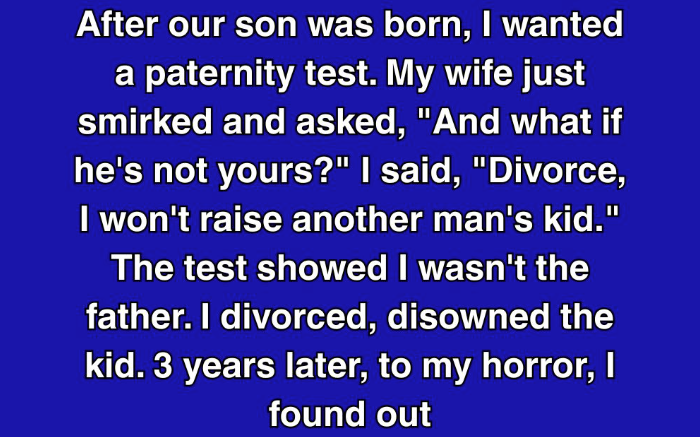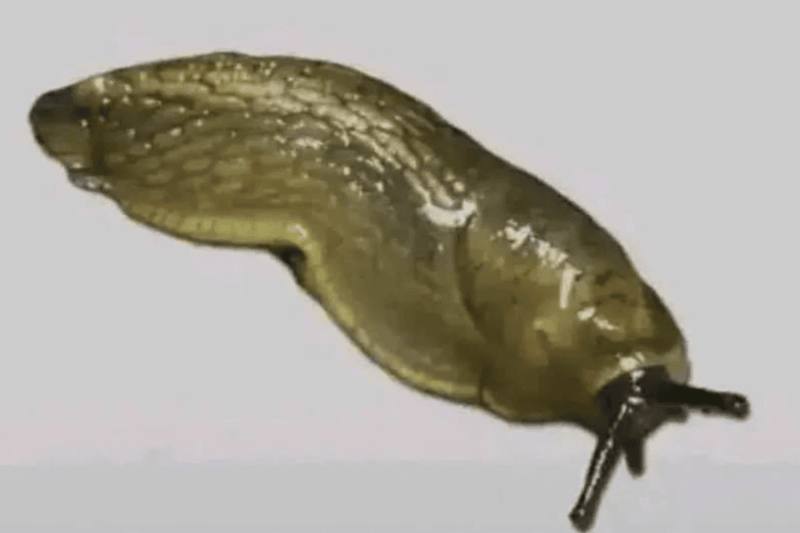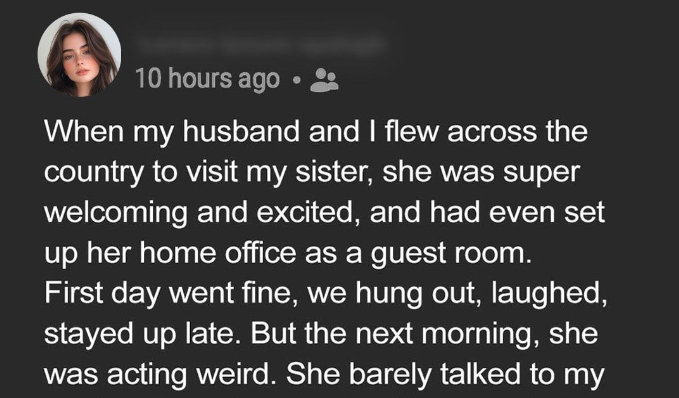After our son was born, I insisted on a paternity test. My wife, Zara, gave a faint smile and asked, “What happens if he’s not yours?” I replied, “Divorce. I won’t raise another man’s child.” The results came back: I wasn’t the father. So I filed for divorce and walked away from the child. Three years later, a chilling truth surfaced.
The test was wrong.
A lab error—caught during an internal audit—changed everything. A letter arrived, buried in a pile of forwarded mail from my old address. I nearly tossed it, mistaking it for spam. But the lab’s name sparked a uneasy feeling in my gut.
I sat at my kitchen table and tore it open. The letter was formal, filled with stiff, legal language and a brief apology: “Due to a clerical error and sample mislabeling, the paternity results you received in 2022 were incorrect.”
I read it three times to process it.
Then I sat, staring at the paper, a heavy dread washing over me.
The truth: he was my son. My boy.
And I had abandoned him.
Three years.
Three birthdays missed. Three Christmases gone. His first words, his first steps—all moments I’d never get back.
I left it all behind, convinced it wasn’t mine to claim. Now I faced the reality that I was the one who walked away. Not Zara. Not some fictional other man. Me.
The hardest part? Zara never fought my decision.
When I told her I was filing for divorce, she didn’t yell or plead. She simply said, “If that’s what you need.”
Now I understood why.
She had been honest all along.
The next day, I stood at her doorstep. Same apartment complex. Same number. It felt like stepping into a past that no longer welcomed me.
When Zara opened the door, her eyes widened. But there was no warmth, no forgiveness. Only a guarded stillness.
“What do you want?” she asked.
“I need to talk. About the test.”
She let me inside, but only to the entryway. From a back room, I heard a child’s laughter. My heart stopped. My feet felt rooted to the floor.
“Is that… him?” I whispered.
“Yes,” she replied. “His name’s Milan now. He turned three in June.”
My throat tightened, burning.
“He’s mine,” I said.
She paused, then said, “Yes. I know.”
And I broke down.
Right there, in her hallway.
Zara didn’t console me. She stood, arms crossed, waiting.
When I could speak, I poured it all out. The letter. The lab’s mistake. How my cousin’s comment about the boy looking “too light-skinned” planted a seed of doubt that grew into a wildfire, burning everything down.
She listened. Nothing more.
When I finished, she said, “I told him his dad died in a car accident. I didn’t want him thinking you chose to leave.”
My legs nearly gave out.
A lie that shielded me.
Despite everything I’d done.
“Can I see him?” I asked.
She shook her head. “Not yet.”
I didn’t push. I had no right.
I left with shame heavy in my chest and a lawyer’s number in my phone—one Zara recommended for custody or visitation. She wouldn’t block me, but she wouldn’t make it simple either.
She shouldn’t have to.
I hired the lawyer. Started therapy. Documented everything—how the lab’s error misled me, how I acted on false information. But no excuse erased my choice to doubt.
Zara sent updates. A photo here. A school drawing there. Always brief, never personal. Just facts.
Six months passed before I saw Milan in person.
We met at a park, Zara watching from a bench nearby. He ran around in a bright yellow jacket, giggling at pigeons, munching raisins from a cup. He looked so much like me.
The shape of his ears. The way his eyebrows lifted when he smiled.
But to him, I was a stranger.
I introduced myself as “Mr. Noah.”
Not Daddy. Not even Uncle. Just a man at the park.
I accepted it.
That was the price of my choice three years ago.
But kids have a way of sensing things. On our third visit, Milan climbed into my lap and fell asleep. No fear. No questions. Just trust.
That night, I wept harder than ever.
He didn’t know my mistakes. He only knew I felt safe. Warm. Present.
Zara observed it all silently. No approval. No bitterness. Just a steady gaze.
Then, one day, she said, “I’m moving to Atlanta.”
I blinked. “Why?”
“My mom’s sick. I need to be there.”
My stomach sank.
“That’s across the country.”
“I know. That’s why I’m telling you.”
I understood the implications. Less time with Milan. More legal hurdles. Distance.
But how could I ask her to stay when I’d failed so spectacularly?
So I said, “Can I come too?”
She raised an eyebrow. “Come?”
“Move there. I can find work. I want to be in his life, not a visitor every few months.”
She didn’t agree.
But she didn’t refuse either.
So I moved.
Rented a small one-bedroom. Took a job in logistics at a warehouse—simple, but stable. Every Saturday, I spent with Milan. We’d wander the botanical gardens, kick a soccer ball, or I’d hold him while he napped.
He started calling me “Noey.” Then, one day, out of the blue, he said, “My daddy’s name is Noey.”
I turned away so he wouldn’t see my tears.
It was slow. Imperfect. But real.
Zara softened over time.
She invited me for dinner one rainy evening. Then another.
Soon, we were co-parenting almost seamlessly.
One night, picking up toys, she looked at me and said, “I hated you for so long. But I hated how much I still cared even more.”
I didn’t know how to respond.
But I said, “I feel the same.”
We didn’t rush back together. We dated cautiously, like strangers learning each other again. Older. Wiser. Humbler.
Then came another blow.
Milan got sick. A cough turned into high fevers and exhaustion. Tests revealed a rare autoimmune condition—manageable, but lifelong. He’d need careful medication, a special diet, and constant care.
My heart shattered again.
But this time, I stayed.
I was there for every appointment, every hospital night, every follow-up call.
Zara leaned on me, crying in my arms more than once. I held her.
That boy transformed me.
Everything I once valued—pride, status, being right—faded away.
All that mattered was being there.
One night, as Milan slept in his hospital bed, Zara rested her head on my shoulder and whispered, “He’s lucky you came back.”
I shook my head. “I’m lucky you let me.”
And I meant it.
We remarried two years later. A quiet ceremony by a lake in Georgia, with Milan and a few friends. No fanfare.
He was our ring bearer. He dropped the pillow. We all laughed.
Now he’s seven. Healthy. Full of mischief. Loves science, hates peas.
Some days, the guilt of missing his first years still stings.
But he doesn’t hold it against me.
Kids have a generosity adults often lose.
He once said, “You came back. That’s what counts.”
Maybe he’s right.
Maybe life offers one chance to fix your mistakes.
And if you seize it, fully commit, sometimes you find forgiveness.
I learned trust is delicate, but it can be rebuilt.
That pride makes a poor parent, but love can be a great one.
Yes, I left when I shouldn’t have.
But I returned.
And I stayed.
If this story resonates, share it. Someone out there might need a reminder: it’s never too late to make things right. 💙




